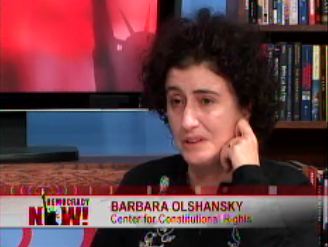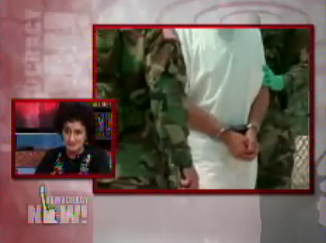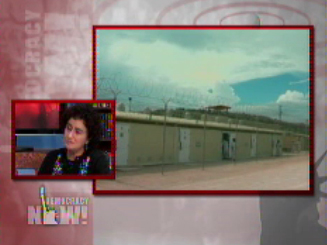As CIA Detainees Transferred to Guantanamo, President Bush Acknowledges Secret P
Democracy Now! via sam | 07.09.2006 21:31 | Analysis | Repression | Social Struggles | World

Alternative procedures to force some prisoners to talk

Alternative procedures to force some prisoners to talk

Alternative procedures to force some prisoners to talk
He denied the U.S. ever uses torture but he admitted the CIA had used what he described as alternative procedures to force some prisoners to talk. Bush also urged Congress to authorize the use of military tribunals and to amend the War Crimes Act. The president said new laws were needed because of the Supreme Court's ruling in June in the Hamdan case.
Barbara Olshansky, attorney with the Center for Constitutional Rights. She is the author of "Secret Trials and Executions: Military Tribunals and the Threat to Democracy." She is also the co-author of "The Case for Impeachment: The Legal Argument for Removing President George W. Bush from Office."
JUAN GONZALEZ: On Wednesday, President Bush acknowledged for the first time that the CIA has been operating a secret network of overseas prisons.
PRESIDENT GEORGE W. BUSH: Many specifics of this program, including where these detainees have been held and the details of their confinement, cannot be divulged. Doing so would provide our enemies with information they could use to take retribution against our allies and harm our country. I can say that questioning the detainees in this program has given us information that has saved innocent lives by helping us stop new attacks.
JUAN GONZALEZ: President Bush made the admission as he ordered 14 prisoners previously held by the CIA to be transferred to Guantanamo Bay, where they could be tried by a military tribunal. The prisoners include alleged 9/11 mastermind Khaled Sheik Muhammad. Bush said the CIA is no longer holding any detainees, but that the secret prisons may be reopened.
PRESIDENT GEORGE W. BUSH: But as more high ranking terrorists are captured, the need to obtain intelligence from them will remain critical, and having a CIA program for questioning terrorists will continue to be crucial to getting life-saving information.
JUAN GONZALEZ: President Bush denied the U.S. ever uses torture, but he admitted the CIA had used what he described as alternative procedures to force some prisoners to talk. Bush also urged Congress to authorize the use of military tribunals and to amend the War Crimes Act. The President said new laws were needed because of the Supreme Court’s ruling in June in the Hamdan case.
PRESIDENT GEORGE W. BUSH: The court determined that a provision of the Geneva Conventions known as Common Article 3 applies to our war with al-Qaeda. This article includes provisions that prohibit outrages upon personal dignity and humiliating and degrading treatment. The problem is that these and other provisions of Common Article 3 are vague and undefined, and each could be interpreted in different ways by an American or foreign judges. And some believe our military and intelligence personnel involved in capturing and questioning terrorists could now be at risk of prosecution under the War Crimes Act, simply for doing their jobs in a thorough and professional way.
AMY GOODMAN: President Bush, yesterday. Barbara Olshansky joins us in the studio today, an attorney with the Center for Constitutional Rights, author of Secret Trials and Executions: Military Tribunals and the Threat to Democracy. Welcome to Democracy Now!, Barbara.
BARBARA OLSHANSKY: Thank you for having me.
AMY GOODMAN: Your response to President Bush's address.
BARBARA OLSHANSKY: You know, there are several. The President’s speech came along with a series of documents: a Department of Defense directive, a new Army field manual that was revised, and this bill. If you put them all together, it says some very interesting things. First, there is the admission, like you said, of the existence of secret prisons, which we knew and they have categorically denied, all across Europe and all across the United States.
But this idea of the CIA program, that language that the President used, we know that that program is a codeword for the use of torture. There's just no doubt about it, because we know how badly people were tortured in Iraq, in Afghanistan and in Guantanamo, and we know that not just from detainees' testimony, but from the testimony of FBI officials, CIA officials. Lots of people have come forward. And the President then is asking the American public and Congress to approve a program of torture going forward.
And when he says the United States doesn't torture and I never authorize torture, that is a very interesting word play, because all of the government's documents, all of the White House documents, go to this issue of redefining torture in a way that we don't define it in the United States or in the world. And that definition says torture only occurs when someone’s at the risk of immediate full organ failure or death. So that's the word “torture” that the president is using. That's not our constitutional definition of torture. That's not the international definition of torture. And you know what? That's not the American people's definition of torture.
JUAN GONZALEZ: And what about this whole issue of the War Crimes Act and having Congress revisit that?
BARBARA OLSHANSKY: Well, that one is really on the same -- in the same arena. It is retroactive immunity for everyone that engaged in torture. And the fact is that torture policy really specifically came down from the highest on the high. And in fact, the President, in his speech yesterday, admitted that, that he authorized it, that Rumsfeld put it into effect. And so now we know everyone did it. They said it. And, you know, that idea of being authorized from the top, well, we now know that that happened. And soldiers who follow a policy that violates the law, you know what, we don't exonerate them, because that idea of “they told me to do it,” you know, that principle went out in Nuremburg in the Second World War when it was used by Nazi soldiers. We don't abide by that. No one in the world does. And that's what the President is asking for now: immunity for everyone who is going to say, “My superior told me so.”
JUAN GONZALEZ: Why did all of this come now, this sort of a coordinated decision now to bring this to the forefront, to try to push it through Congress at this stage?
BARBARA OLSHANSKY: I think that it is really fundamentally a political move. I think this is an administration that is very scared. There's an election coming up. I think the numbers for this president have been extremely low. I think there have been case after case in the Supreme Court, where the justices -- and these are conservative justices -- have said, “You can't do this. You don't get a blank check. You don't get to work outside the Constitution, outside the rule of law.” And they’ve said it -- they said it in Rasul v. Bush, about challenging the detentions. They said it in Hamdi, about giving someone the most basic due process. And they said it in Hamdan, about what our due process requires in any kind of court that we hold. And so now you have a bill, this huge 86-page bill, that is an attempt to overrule every Supreme Court decision that's come down in the war on terror.
AMY GOODMAN: In what way?
BARBARA OLSHANSKY: Well, it says that the Detainee Treatment Act fulfills all of our requirements under the Geneva Conventions to outlaw cruel and inhuman treatment. But the Detainee Treatment Act prohibits anyone from enforcing its prohibition. We can't ever go into court to stop cruel treatment or torture. So the idea that it fulfills our obligations is just unbelievable nonsense.
And then it says the Geneva Conventions can't ever be enforced by an individual in court. Our courts have never said that. And no country around the world has ever said that. You know, if we can't go into court to enforce what our individual rights -- right? --your right to a trial, your right not to be brutally treated, all of those are individual rights. If we say people can't go into court to enforce them, what's going to happen to our soldiers in every other country where they are captured? They don't get to invoke those protections. How blind could this administration be to the effects on our own guys everywhere they’re fighting?
JUAN GONZALEZ: Now, in the conversation we had before we went on the air, you mentioned also that the bill addresses this whole issue of whether American citizens can be held as enemy combatants and put in military tribunals versus being tried in regular American courts.
BARBARA OLSHANSKY: Yeah. And this was something that really we have had a number of conversations about, you know, with people on the Hill, some people in the White House, about the fact that an administration bill that was leaked included the word “people” instead of the word “aliens,” because the President's November 13th military order in 2001 said “non-citizens.” Well, now, the language says an unlawful enemy combatant can be any individual. And it's very clear that that means Americans. It can mean anyone in the world. There is no exclusion, you know, for Americans. And the language of who can be an enemy combatant has been tremendously expanded. So it could be, you know, not only al-Qaeda and other terrorist organizations, but other associated forces and just others who are unnamed. And it's any hostile act, not necessarily a military act. Am I hostile by talking about what's wrong with this, by sitting here with you? How are we going to know that? And then I end up in Guantanamo in a military commission, where the death penalty can result? This is astounding stuff.
AMY GOODMAN: The legislation that President Bush is proposing would limit the ability of prisoners to access all evidence. The Republicans, who are challenging the proposal, are very significant. I mean, you've got John McCain, who was a prisoner of war himself. You’ve got Senator Lindsey Graham of South Carolina, a former military lawyer, still serving in the Air National Guard as a reserve judge, and Senator John Warner of Virginia, chair of the Armed Services Committee.
BARBARA OLSHANSKY: Yeah. I think these are people that are so familiar with our military justice system that they should know, and I think what they are saying means they do know that we have an existing military justice system that’s worked for more than 50 years. It's incredibly effective. It is a well thought out, well established, well ruled, you know, system that everyone believes in in the military. And people can't see any reason for permitting the President this new power to create a system wholly outside of everyone else, an entire new universe with new words and new terms and new offenses that are outside the law and that he has just fabricated.
AMY GOODMAN: At the same time, the military held a news conference, the Pentagon, talking about new rules. What are they?
BARBARA OLSHANSKY: Well, there are many more rules in here than were spelled out before. So they talk about some of the offenses for the first time, because in the first go-around, no offenses were set forth. So you had no idea what you would be tried for. And in fact, you'd be designated for a military trial, and, you know, a year later, they'd say, we think you did a, b, and c. So they sort of went back and crafted the crime based on what they thought you did.
Now, there are some crimes that are specified in the bill. The problem is, there are many crimes that are not recognizable in the laws of war. And so, we're still doing that, creating things out of whole cloth, when we have a military justice system that specifies those crimes. What are the crimes that people commit when they are in the military?
And for people that are not military soldiers, for civilians, we know what we can accuse them of: every kind of regular criminal act, including things -- war crimes, including genocide. We can go after terrorists for all of those things.
And this is that fundamental divide that we come to again, which is, you know, the criminal justice system, being a perfectly valid system to try terrorists. And in the UK, what happened recently in London just shows that. They did an investigation. They stopped anything before it happened. Those people are able to be tried. There is nothing that is fundamentally tricky about this. What's tricky is when you hold people in indefinite detention and torture them.
AMY GOODMAN: Barbara Olshansky, I want to thank you very much for joining us, with the Center for Constitutional Rights, an attorney who is author of the book, Secret Trials and Executions: Military Tribunals and the Threat to Democracy, also coauthor of The Case for Impeachment: The Legal Argument for Removing President George W. Bush from Office.
 http://www.democracynow.org/
http://www.democracynow.org/ Related:
Australia: Thousands hear US military lawyer for David Hicks
No doubt the Howard government will respond to the growing demands for Hicks’s immediate release in the only way it knows—with more slander and innuendo. But as the popular response to Mori’s public meetings and lectures makes clear, a definite shift has taken place in public sentiment that will only deepen in the coming period.
 http://adelaide.indymedia.org/newswire/display_any/21796
http://adelaide.indymedia.org/newswire/display_any/21796
Democracy Now! via sam